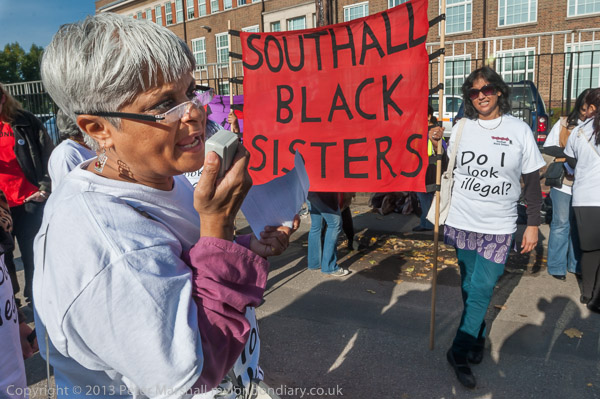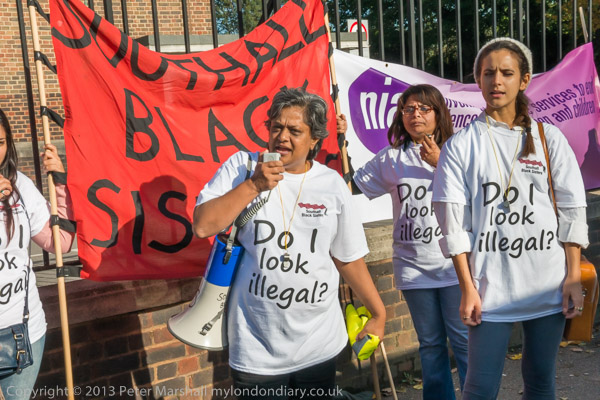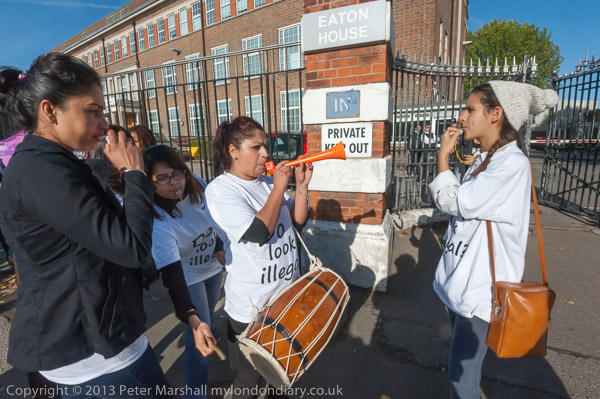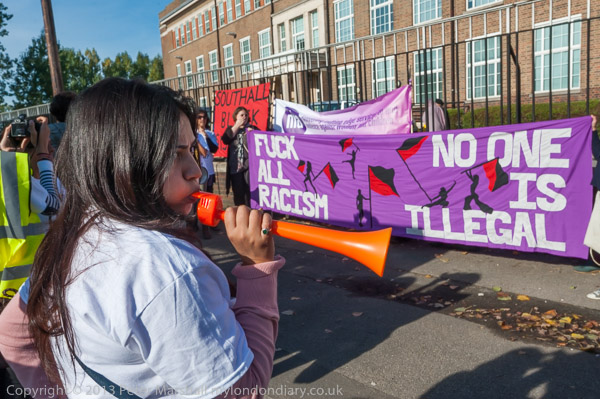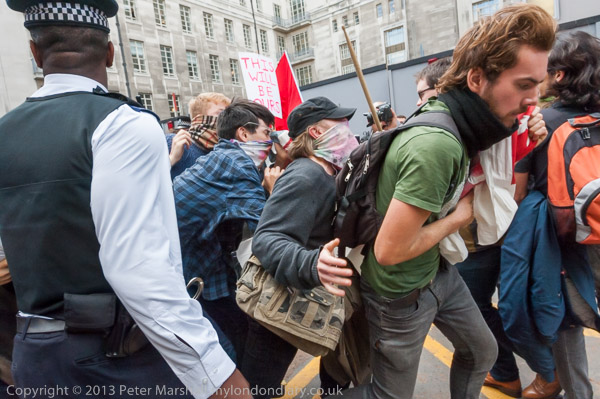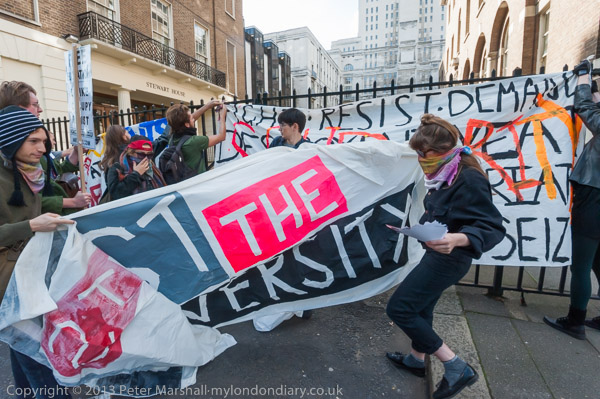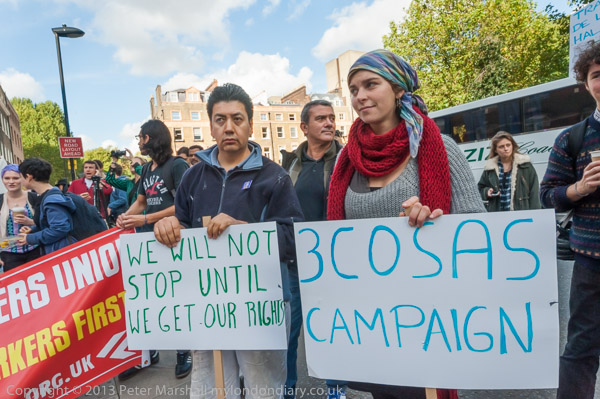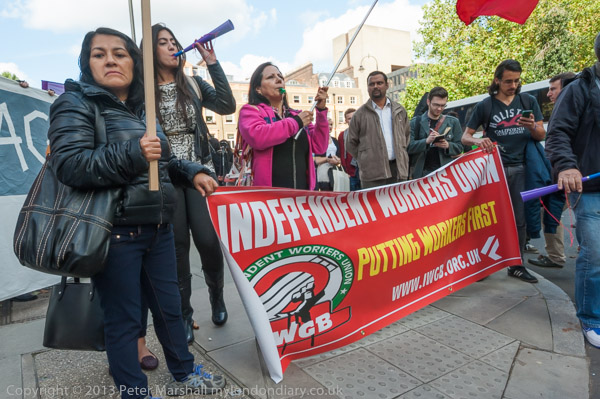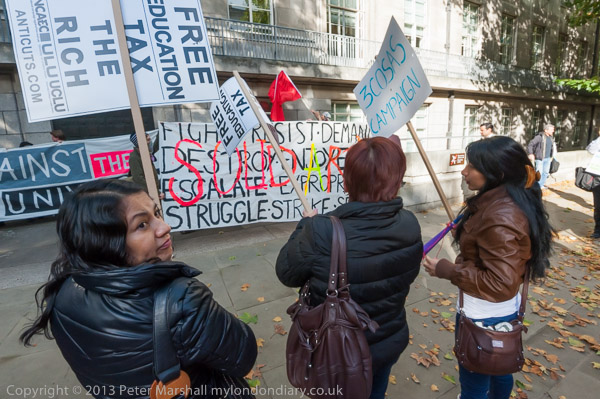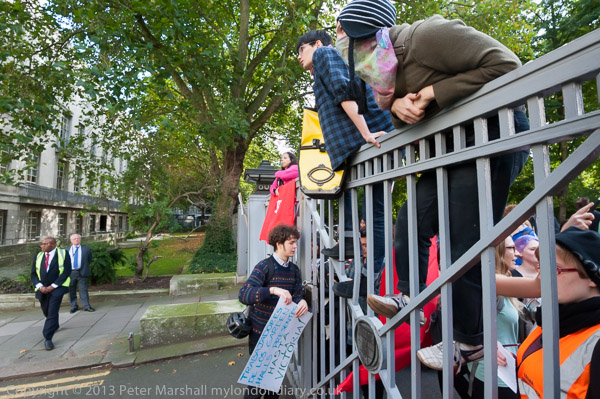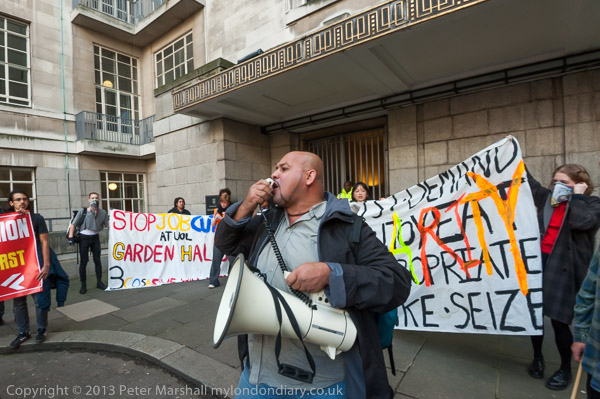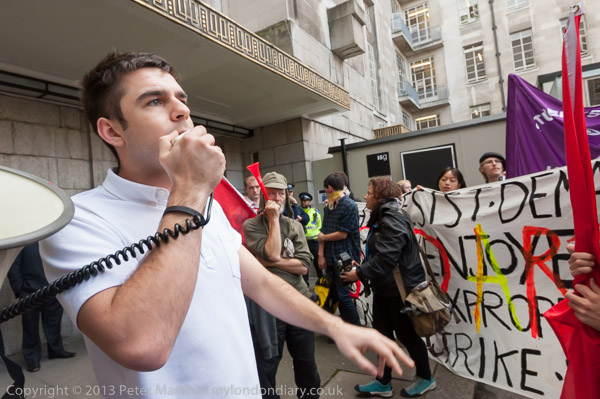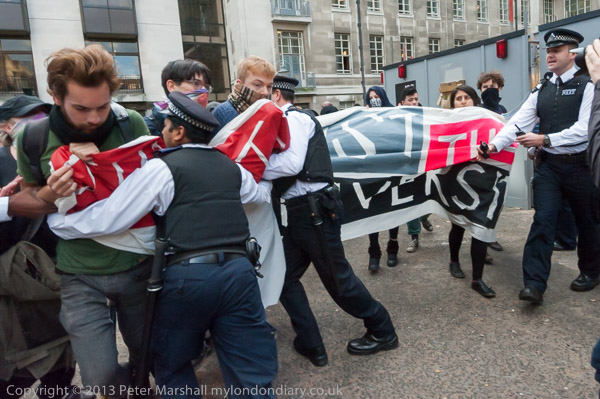On the IWGB ‘3 Cosas’ Battle Bus: On Tuesday 18th January 2014 I got up uncharacteristically early and joined a packed rush hour train into London, something I usually like to avoid. The bus to Russell Square was also slow, held up in busy traffic, but even so I joined the morning picket at the east gate to the entrance to the Senate House car park before 9am and was taking pictures.
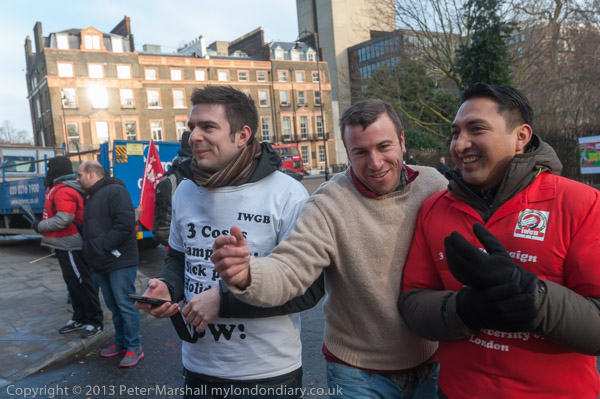
It was a bright winter morning, but not much above freezing and not the kind of day anyone sensible would go on an open-top bus ride around London, and though I’d layered up well for the event it was still chilling.

But those on the picket line on the second day of the 3 day strike by the IWGB for union recognition and better conditions had already been there since 5am, beginning while I was still sleeping in a warm bed and were still in good spirits. Cleaners, maintenance and security staff who work in the University of London were joined by student leaders and students from the University. Of course many of the workers would normally have been at work in the early hours.
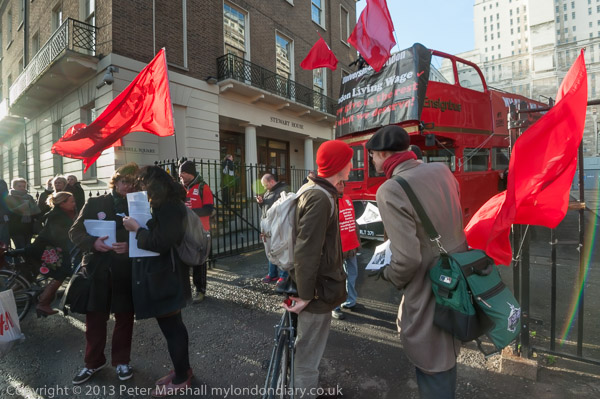
Although these workers work at the university and carry out work essential for the running of the university, the university does not employ them. Most low paid workers – cleaners, maintenance and security staff, catering workers and others – at the University of London are no longer directly employed by the University, but work in the University on contracts from contractors.

Outsourcing these workers enables the University to evade its responsibilities towards this essential part of their workforce who suffer from poorer conditions and pay and aggressive management from the contractors that any responsible employer would be ashamed to implement. Most were only getting the legal minimum in terms of pay, pensions, sick pay and holidays, well inferior to comparable fellow workers directly employed by the University.
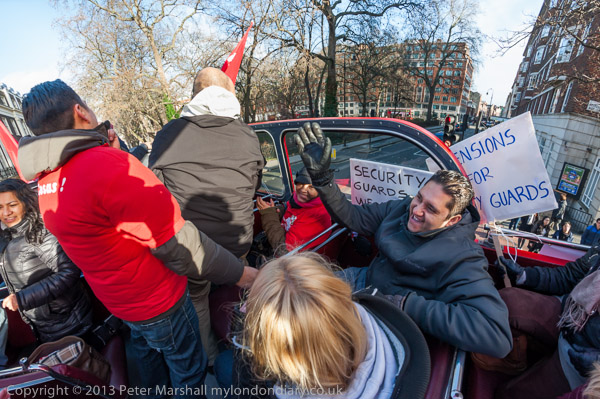
In the past these precarious employees had belonged, if at all, to traditional unions such as Unison, who had taken their fees but done nothing to improve their conditions, often seeming to them to only be concerned in keeping the differential between those on the lowest pay and higher paid staff.
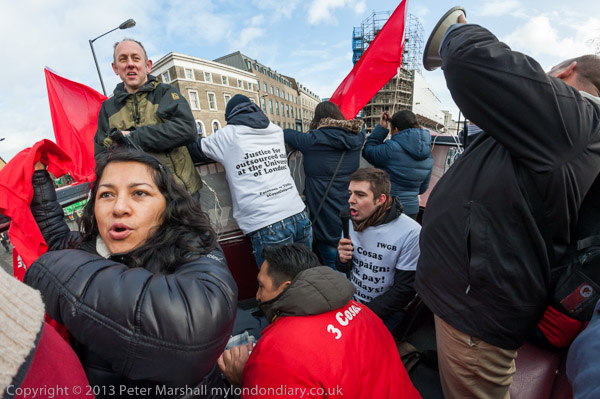
It was only when these workers, many of them Spanish-speaking, joined the newly formed grass roots union, the Independent Workers’ Union of Great Britain, that they were able to achieve some gains thanks to noisy public protests and strong negotiating by the union which by 2013 had won them the London Living Wage, considerably more than the national minimum wage. They achieved this despite both the University of London and the employers refusing to recognise the IWGB, continuing to recognise the more compliant Unison to which few if any of these workers belonged.

In 2013, having won the London Living Wage and started the now famous 3 Cosas or “three things” campaign for sick pay, holiday pay and pensions, as well as continuing to press for union recognition.

This 3-day strike, following another strike the previous November, was the latest action in this campaign. Union recognition was particularly important for those working at the Garden Halls of residence in Bloomsbury which the university was intending to close in the coming Summer. The IWGB was demanding these workers be given priority for vacancies that arise elsewhere in the university, with preference being given to those with the longer periods of service, but the employers were refusing any cooperation.

Waiting for us in the driveway was an open-top bus, and after I had been there around an hour most of the strikers and supporters boarded this ‘battle bus’ to go on a protest tour of various sites in London, with just a small picket remaining. I had been invited to go with them on top of the bus to take photographs.

“The sun shone on the workers as the bus drove away, followed by a group of student supporters on bicycles. I was on the upper deck taking photographs as the workers waved their red IWGB flags, chanted and listened to IWGB Branch Secretary Jason Moyer-Lee, Branch Chair Henry Lopez, President of the Independent Workers of Great Britain Alberto Durango, Branch Vice-Chair and leading member of the 3 Cosas Campaign Sonia Chura and University of London Union Vice-President Daniel Cooper as they used a powerful public address system to address the public and workers about the fight for union recognition for the IWGB and comparable conditions of service with directly employed University of London workers for outsourced workers at the university.

In between the various speeches and chants, including some in both Spanish and translated into English, there was loud music to draw attention and also to keep the strikers happy.”
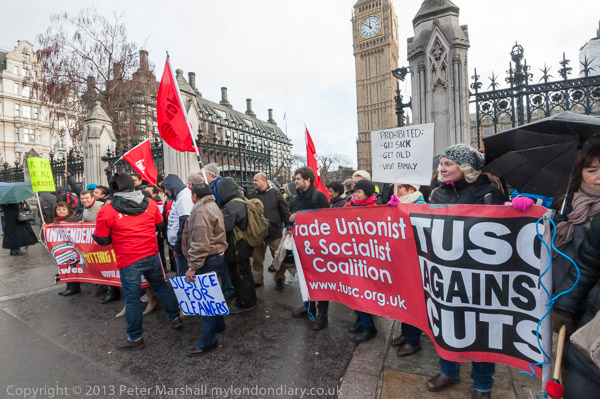
The first stop was in Cartwright Gardens outside the University’s Garden Halls of residence where there were several speeches from the top of the bus. Somehow we went on to drive past the Unison headquarters on Euston Road in both directions, to booing from many of the workers, and on the second pass an IWGB flag was caught in the branches of a tree and left flying in front of the Unison building.
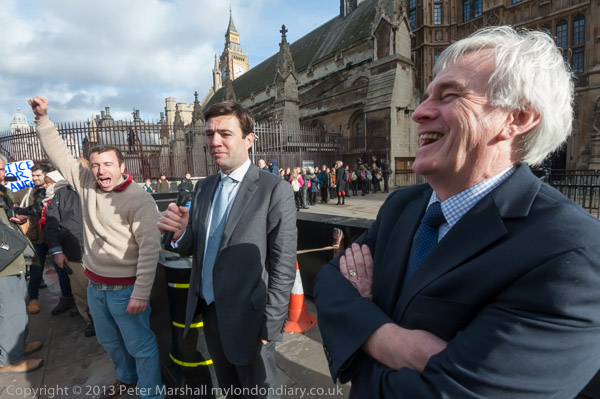
The route had been planned to stop outside the offices of The Guardian, but it, like most London buses, was running late due to traffic congestion, and it continued on to go very noisily through Trafalgar Square and down Whitehall, before a complete circuit of Parliament Square before stopping to let us get off outside the Supreme Court.

There was then a rally on the pavement in front of Parliament, with short speeches by Labour MPs John McDonnell, Andy Burnham and Jeremy Corbyn who had come out to join us.
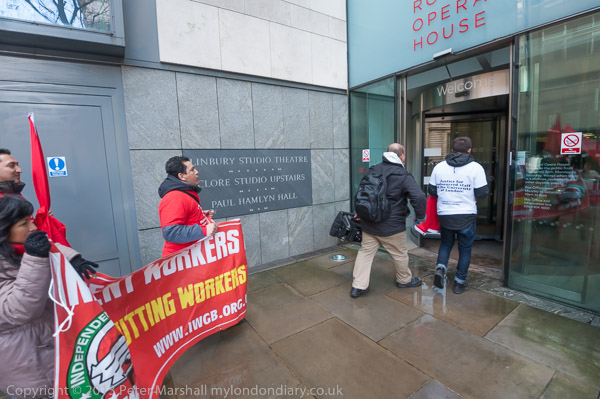
We marched to the Embankment and boarded the bus again for a short journey, leaving the bus just around the corner from the Royal Opera House, where everyone kept quiet as we approached the building and then rushed in. The IWGB had been campaigning there for some time for the London Living Wage.
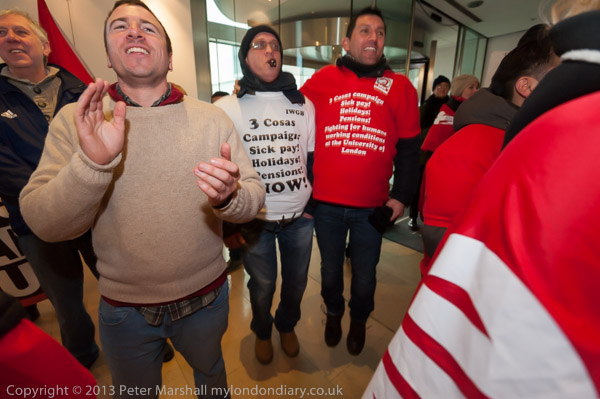
This is another workplace where the management had refused to recognise and have talks with the IWGB, preferring to recognise Unison. The IWGB were confronted there by the Unison Health & Safety rep who told them the management had now agreed to pay cleaners the Living Wage but hadn’t yet told them. Doubtless this was another victory for the protests by the IWGB, though of course he refused to acknowledge this.

We piled back onto the bus and went to the offices of the new employer of the outsourced workers, Cofely GDF-Suez, who had taken over from Balfour Beatty Workplace in December. Police were there and the front and back gates were both locked. The workers held a brief rally outside the gate in Torrens Place.
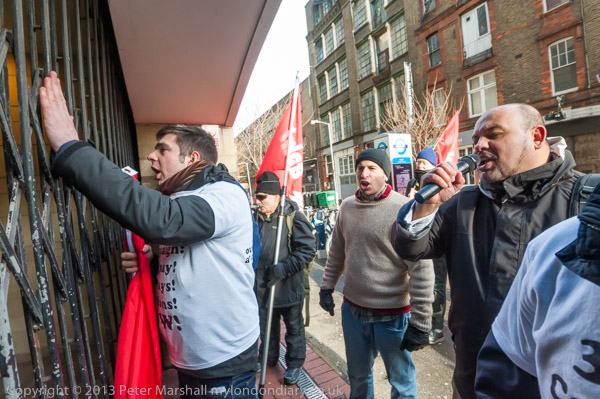
I was invited to go back on the bus to a late lunch with the workers at the Elephant & Castle – but it was already after 2pm and I didn’t relish the thought of another long bus ride. So I said goodbye and began my journey home to work on and file some of the many pictures I had taken over the day.
You can read more about this in posts on My London Diary, where there are also many more pictures.
‘3 Cosas’ Strike Picket
‘3 Cosas’ Strike Picket and Battle Bus
IWGB at Parliament
IWGB in Royal Opera House
IWGB at Cofely GDF-Suez
Flickr – Facebook – My London Diary – Hull Photos – Lea Valley – Paris
London’s Industrial Heritage – London Photos
All photographs on this page are copyright © Peter Marshall.
Contact me to buy prints or licence to reproduce.
